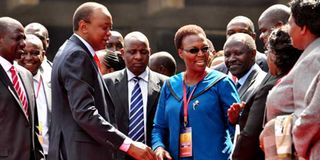If it comes to it, let us vote on the ideal wage bill

President Uhuru Kenyatta, accompanied by Deputy President William Ruto is introduced to commissioners by the Salaries and Remuneration Commission chairperson Sarah Serem during a debate on the National Wage Bill at KICC in Nairobi on March 10, 2014. PHOTO | SALATON NJAU
What you need to know:
- The President spoke at the opening of a national dialogue conference headlined by the Salaries and Remuneration Commission (SRC) and chaired by Mrs Sarah Serem
- As it guides Kenya to show the world how to create a public payroll, the SRC should introduce questionnaires and collect memoranda from citizens at its county hall meetings
In April last year, a freshly elected President Uhuru Kenyatta warned that a public wage bill gobbling up more than 40 per cent of government revenue was unsustainable. More importantly, he asked government apparatchiks to work together to bring it down. Last week, it was evident nothing had been done to reduce the payroll.
Last October, the President reacted swiftly to reports that a whopping Sh300 billion of public money could not be accounted for. He ordered ministries to prepare detailed reports of their expenditure and submit them to his office in a week’s time. Nothing has been done to publicly call out the culprits on this wanton rape of public coffers.
In January, the President stunned many when he said government loses Sh1.8 billion annually in paying salaries to ghost workers. So the Devolution ministry announced last week that it would carry out an audit to weed out ghosts from the public payroll.
Listen, we cannot have ghost workers in the era of the Integrated Financial Management System. This is a planned, top-level, deliberate scheme of stealing public money.
Lastly, last week, the President, in a no-nonsense speech, asked all public service top dogs and parastatal fat cats to follow the example he set days earlier and take a 20 per cent pay cut. He told those who may be unhappy with his directive to go to court. Reactions to this tough directive has, naturally, run the gamut of emotions. (READ: Uhuru, Ruto to take 20pc pay cut)
Will something happen? It may because, significantly, the President spoke at the opening of a national dialogue conference headlined by the Salaries and Remuneration Commission (SRC) and chaired by Mrs Sarah Serem. The dialogue is meant to enable ordinary Kenyans craft, and therefore own, a public service payroll structure.
My contribution revolves around several issues highlighted above namely: lethargy in government; massive wastage in government spending; asking Kenyans to sacrifice for the future of their country and the need to set aside transient politics and address the matter of the public payroll from a long term economic standpoint.
Here are my suggestions:
— like employees taking a pay cut to save their company from bankruptcy, Kenyans should craft a public payroll which caps the highest salary at Sh1 million and the lowest at Sh20,000;
— cut massive wastage and extravagant spending. For example, government should not buy cars for CSs, PSs, parastatal chiefs and others, but give them loans to purchase those vehicles;
— punish thievery of public money severely, starting with the perpetrators of the lucrative ghost workers’ swindle;
— abolish the Senate and assign its work to a committee of Parliament;
— reduce counties to 16 and keep parliamentary constituencies at 200;
— reduce allowances for public servants and cut down on seminars and travel;
— government deals swiftly with situations that lead to accumulation of interest or debt; depreciation of assets and myriad ways through which money is lost;
— government sells off loss-making and non-strategic parastatals and, at the same time, generate opportunities for the private sector to create jobs; and
— politicians to close ranks over trimming of the bloated public service to save Kenya from economic collapse.
As it guides Kenya to show the world how to create a public payroll, the SRC should introduce questionnaires and collect memoranda from citizens at its county hall meetings. It must, even if this debate becomes a referendum on the plunder of public money.
*****
In 1977, Attorney General Charles Njonjo was rumoured to have celebrated the collapse of the East African Community (EAC). Not surprisingly, 37 years later he is lamenting the revival and expansion of the EAC and the sustained drive to closer regional co-operation. He regrets that the lessons of the 1970s have not been learnt. (READ: It's time for a referendum on the East African Community)
No, the successors of the founders of the original EAC could not have founded the second Community if they were not ready to address and redress the pitfalls of the first. Regional economic groupings are emerging all over the world and entering economic partnerships with their counterparts such as the giant European Union.
Yes, it makes business sense to market the EAC as a region of opportunity for industrial investment because it has a market of 139 million people and for tourists to use one visa to visit Kenya, Uganda and Rwanda. Kenyans, Ugandans and Rwandans need only their national IDs to go across their borders.
Come on, Mr Njonjo; use your vast experience and wisdom to help the Community overcome its past and present challenges.
Opanga is a media consultant. [email protected]





